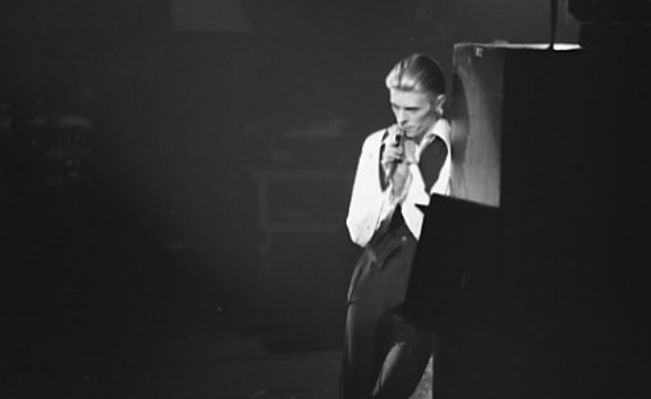 David Bowie in 1976. Photo: O'Keefe center
David Bowie in 1976. Photo: O'Keefe center
Philosophy Football’s Bowie shirts are a fitting memorial for the late artist, writes Mark Perryman
When Bowie sang that we could all be heroes, ‘we can be us’ just for one day he was celebrating a fundamental challenge to models of masculinity, gender and sexuality. The ever-changing Bowie was a popular internationalist, equally at home in London, Berlin and New York, appreciative and understanding of each of these cities’ cultures and histories. He made us feel part of his world, not apart from it. Amateurishly daubing our own lightning flash across our faces, dyeing our hair and cutting it into a soulboy or soulgirl wedgecut, scouring the second-hand clothes shops to keep up with Bowie’s latest ransacking of fashion’s histories for his latest look.
Yes he had his off-moments. None more so when like too many artists he flirted with nazi-chic. It was a mistake that led directly to one of the most significant fusions of popular culture and protest in modern times , Rock against Racism. Bowie found himself on the wrong side of the argument but it was never where he belonged and he soon enough realised that.
Writer and cultural critic Suzanne Moore summed up beautifully up what Bowie at his best meant:
That door. He unlocked it. For me, for you. For us. He gave us everything. He gave us ideas, ideas above our station. All THE ideas and a specific one. Of life. The stellar idea that we can create ourselves whoever we are. He let us be more than we ever knew possible. There is nothing greater.’
This is a politics of identity that both finds individual expression via committing personal acts of rebellion but never loses sight of the fact and the need of the collective too. That if racism, sexism and homophobia are to be truly challenged then it it’s we who have to be heroes, not me. Bowie was part and parcel with those social movements that initiated in the course of his long, but ended too short, career changes for the better. Not just providing the soundtrack but the symbolism of what those changes might look like too.
David Bowie didn’t come from a privileged background. When musicians and actors are increasingly drawn from the ranks of those who have benefited from the best musical and drama private education money can buy, it is only right questions should be asked. Bowie’s 1960s and 1970s state education afforded a sometimes difficult child opportunities to learn and develop via painting, design and dance that are being increasingly denied working-class children today.
Philosophy Football is therefore remembering Bowie with a purpose. Each of our memorial shirts raises funds for Arts Emergency who support further education students who have the will and the ambition to study the arts but neither the finances nor the ‘right connections’ to do so. Via a very practical programme of advice and mentoring Arts Emergency provides key support at a crucial time in young people’s lives denied in the 21st century the kind of educational opportunities to explore themselves artistically Bowie enjoyed more than 50 years ago. And the consequences? Arts Emergency patron Stewart Lee explains: ‘Arts Emergency are highlighting the reversal of decades of social access to the arts, and by association the possible disappearance of whole strands of discourse and the loss of educational enfranchisement to future generations. Save the thinker!’

All art is socially constructed. This is what Bowie as an artist challenged so fundamentally. Philosophy Football’s fundraising Bowie shirts for Arts Emergency, a fitting memorial for an ambition that remains.
Philosophy Football Bowie shirts for Arts Emergency are available to buy online.
Arts Emergency on why the arts matter and their work supporting young people with the ambition to study the arts and work in the cultural industries.

